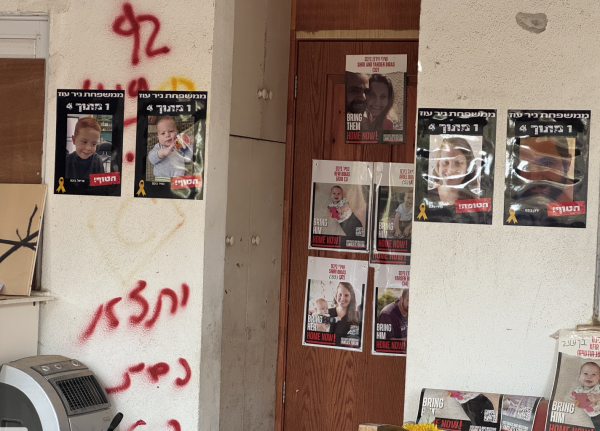Silencing the Echo at Latin
At Latin, opposing politics are often looked down on. How can we create a community that encourages these multi-perspective conversations?
At Latin discourse is plentiful if it’s liberal.
Around the school, one can often find students and other community members having passionate conversations about climate change, abortion rights, and the war in the Middle East. But with a few rare exceptions, the conversations aren’t typically debates; rather, they are agreements. Even The Forum is guilty of providing primarily left-leaning coverage, as shown in opinion pieces on Marjorie Taylor Greene, gun restrictions, and multiple pieces on Roe v. Wade.
A study at Princeton University recognized these types of communities and coined them as “echo chambers.” An echo chamber is a community where people gravitate toward those with similar opinions, and it polarizes the entire group at large. So ultimately, while the difficult conversations are being had, they aren’t helping with progress. There is scant debate or perspective, only agreement.
And much to our dismay, Latin is often an echo chamber.
The Forum conducted an anonymous survey asking students what political party they identify with and if they felt comfortable sharing their opinions publicly at Latin. While the survey was small, with only 22 responses, 14 students identified themselves as Democrats and of the 14, all but one said they didn’t feel the need to censor their views at Latin. Four students self-identified as Republicans, and of the four, only one said they felt comfortable sharing their opinions openly.
Latin, and the rest of the world, has become so polarized over the past 10 years because of a variety of factors. The goals of each political party are changing, as is the political climate, and physical climate, of the world.
Much of that polarization stems from the growing influence of technology and social media. Social media algorithms today control what we see. As soon as something, anything, happens—tragic or exciting—you’ll see it on your feed within the hour.
For example, when the war in the Middle East began, we could see it everywhere. Every Instagram story. Snapchat story. Facebook story. X story. But you see just your opinion. Your side. Your view. One view. One opinion. One side. Social media is just another form of reverberation because that’s our life. We live in a series of cognitive bubbles where we constantly hear what we want to hear.
And this echo isn’t unwelcome, but we also need to understand that this opinion is only one small part of the world, and there is so much more for us to know and learn and engage in. We need to close this gap. Let’s make Latin, and everything at Latin, a public forum. A place where people feel they can be honest and open about what they believe. A place for respect.
It starts with just noticing your echo. Notice what you read, repost, hear, say, and think. Two students at California High School in San Ramon, California created an app called Nütrl that measures the amount of political bias in news sources and offers comparisons for readers in order to offer the most diverse opinion possible. They felt that because they live in such a small, biased community, people were not forming their own opinions. With their app, community members can understand all sides of the story rather than just seeing what’s in front of them, and build their own opinions.
Maybe Nütrl is not the right answer for Latin, but it’s the right idea. We as a community need to find some way to close the gap and quiet the echo. Latin’s mission statement claims that the school strives to “[embrace] diversity of people, cultures, and ideas.” And as of now, we certainly aren’t embracing a diversity of ideas. At least not when it comes to politics and civil discourse. Sometimes it feels like it’s “right or wrong,” and when it comes to politics and the issues we are referencing, it’s absolutely not.
Latin offers a lot of spaces for open dialogues and conversations. But are they really “dialogues” when we all agree? We need to deepen these conversations and support one another. This community will not and cannot grow without disagreeing and challenging one another. Not everybody is going to agree all the time, and that is okay. Hell, that is amazing.
Rather than avoiding conflicts and differences of opinion, we should actively seek out and embrace those clashes and disagreements, welcoming them as opportunities for growth and understanding within our community.

Eliza Lampert (’24) is a senior at Latin and is overjoyed to serve as one of this year’s Editors-in-Chief. During her time writing for The Forum, she...



















































